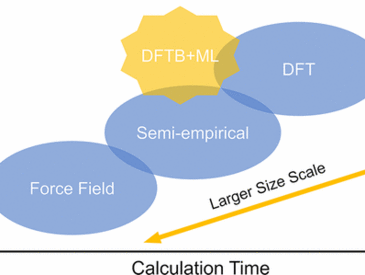W. Sun, G. Fan, T. van der Heide, A. McSloy, T. Frauenheim, and B. Aradi
J. Chem. Theory Comput. 19, 13 (2023)
Density functional tight binding (DFTB) is an approximate density functional based quantum chemical simulation method with low computational cost. In order to increase its accuracy, we have introduced a machine learning algorithm to optimize several parameters of the DFTB method, concentrating on solids with defects. The backpropagation algorithm was used to reduce the error between DFTB and DFT results with respect to the training data set and to obtain adjusted DFTB Hamiltonian and overlap matrix elements. Afterward, the generalization capability of the trained model was tested for geometries not being part of the training set. In the current work, we have focused on defective periodic silicon and silicon carbide systems as target materials and the density of states (DOS) as target property to demonstrate the feasibility of our approach. The trained model was able to reduce the differences between the DFTB and DFT DOS significantly, while other derived properties (for example, Mulliken population distribution, projected DOS) remained physically sound. Also, the transferability of the obtained model could be verified. Our method allows to carry out relatively fast simulations with high accuracy and only moderate training efforts, and represents a good compromise for cases, where long-range effects make direct machine learning predictions difficult.

![[Translate to English:]](/fileadmin/user_upload/fachbereiche/fb1/lmcqm/logos/lmcqm-logo-3-padded-up-20.png)
